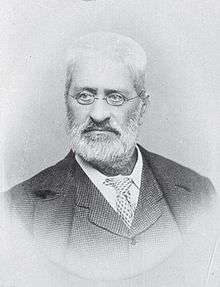Walter Mantell
| Walter Mantell MLC | |
|---|---|
 Mantell in ca 1870 | |
| 3rd Minister of Māori Affairs | |
|
In office July 1861 – December 1861 | |
| Prime Minister | William Fox |
|
In office December 1864 – July 1865 | |
| Prime Minister | Frederick Weld |
| Postmaster-General | |
|
In office August 1862 – August 1862 | |
| Prime Minister | Alfred Domett |
| Member of the New Zealand Parliament for Wallace | |
|
In office 1861 – 1866 | |
| Personal details | |
| Born |
11 March 1820 Lewes, England |
| Died |
7 September 1895 (aged 75) Wellington, New Zealand |
| Spouse(s) |
Mary Sarah Prince (m. 1869; d. 1873) Jane Hardwick (m. 1876) |
| Relations | Gideon Mantell (father) |
Walter Baldock Durrant Mantell (11 March 1820 – 7 September 1895) was a 19th-century New Zealand scientist, politician, and land purchase commissioner. He was a founder and first secretary of the New Zealand Institute, and a collector of moa remains.
Early life
Mantell was born in Lewes, East Sussex, England, the son of geologists Gideon Mantell and Mary Ann Mantell. He arrived in Wellington on the Oriental in 1840.[1]
In 1848, Mantell was appointed to the office of commissioner for extinguishing native titles in the South Island.[2]
Mantell left New Zealand as he did not feel right about trying to convince the indigenous Māori people to undersell their land and returned to England in 1856, where he met Geraldine Jewsbury, a woman eight years his senior. When in New Zealand, the Maori people called Mantell "Matara" (meaning chief in Māori) because they had a difficult time pronouncing his name; Jewsbury used this as a nickname for Mantell. When Mantell was in England he had difficulty finding work. He became restless at home as well as a tendency to act as a hypochondriac. Jewsbury encouraged him to write for the Westminster Gazette or to write a novel about New Zealand. Mantell eventually became tired of his friend's persistent advice. Jewsbury, however, wanted what was best for Mantell and felt deeply attached to him; she once proposed marriage to Mantell in a letter, but he declined her offer. By 1859 Jewsbury had ceased trying to win his love.[3] Shortly thereafter, Mantell returned to New Zealand.[1]
Political career
| Parliament of New Zealand | ||||
| Years | Term | Electorate | Party | |
| 1861–1866 | 3rd | Wallace | Independent | |
Mantell represented the Wallace electorate from 1861 to 1866, when he retired.[4] He was the Minister of Māori Affairs in 1861 and 1864–65, and Postmaster-General briefly in 1862.[5]
From 1866 until his death he was on the New Zealand Legislative Council.[5]
Death and commemoration
He died in Wellington on 7 September 1895.[1]
Mantell is commemorated in the names of the North Island brown kiwi Apteryx mantelli and the North Island takahē Porphyrio mantelli.[1]
References
- 1 2 3 4 Sorrenson, M. P. K. "Mantell, Walter Baldock Durrant". Dictionary of New Zealand Biography. Ministry for Culture and Heritage. Retrieved 13 April 2014.
- ↑ "W. B. D. Mantell: Names of the hapu of the Kai Tahu tribe". Otago University Research Heritage. University of Otago. Retrieved 24 June 2015.
- ↑ Clarke, Norma (1990). Heights: Writing, Friendship, Love: The Jewsbury Sisters, Felicia Hemans, and Jane Welsh Carlyle. London: Routledge.
- ↑ Scholefield, Guy (1925) [First ed. published 1913]. New Zealand Parliamentary Record (2nd ed.). Wellington: Govt. Printer. p. 116.
- 1 2 Wilson, James Oakley (1985) [First ed. published 1913]. New Zealand Parliamentary Record, 1840–1984 (4th ed.). Wellington: V.R. Ward, Govt. Printer. OCLC 154283103.
External links
| Political offices | ||
|---|---|---|
| Preceded by Frederick Weld |
Minister of Native Affairs 1861 1864–1865 |
Succeeded by Dillon Bell |
| Preceded by William Fox |
Succeeded by James FitzGerald | |
| New Zealand Parliament | ||
| Preceded by Dillon Bell |
Member of Parliament for Wallace 1861–1866 Served alongside: Dillon Bell |
Succeeded by Alexander McNeil |